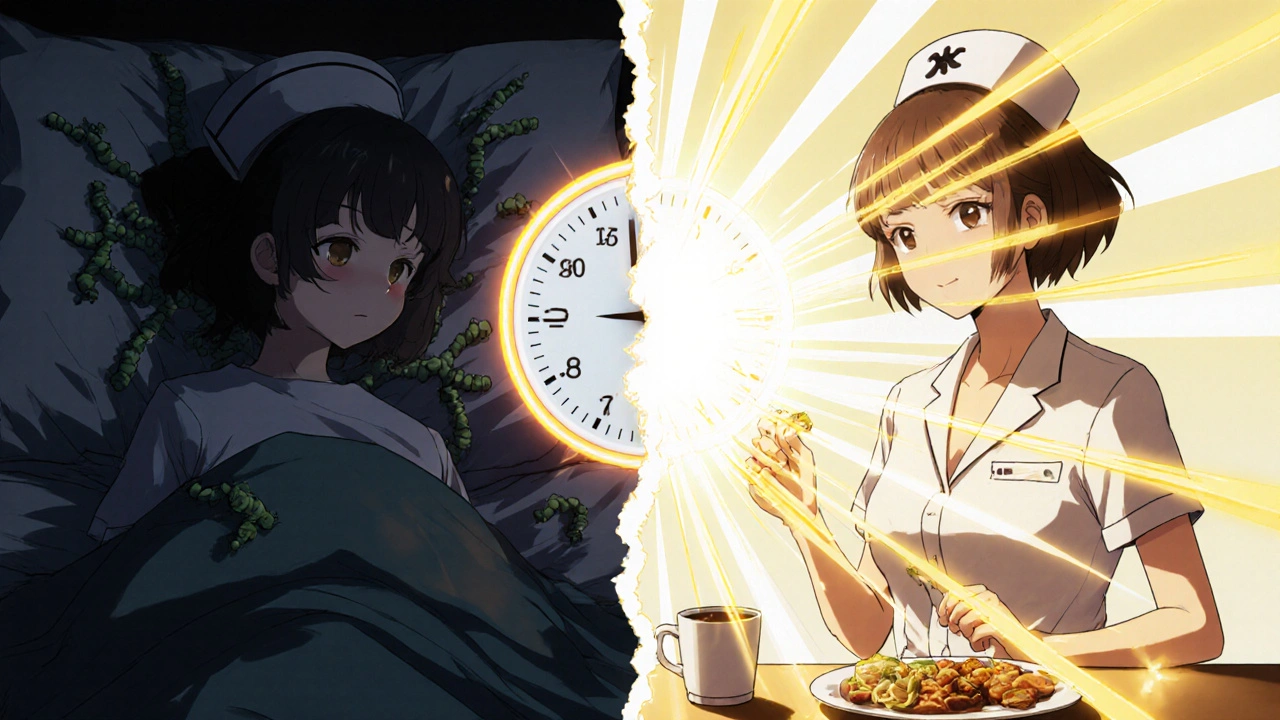Most people think weight gain is just about eating too much or not exercising enough. But what if the real issue isn’t what you eat - but when you eat and sleep? The science is clear: your body’s internal clock, called the circadian rhythm, plays a major role in how your body burns calories, stores fat, and controls hunger. When this clock gets out of sync - whether from late-night scrolling, shift work, or inconsistent sleep - your metabolism slows down, cravings spike, and weight becomes harder to manage.
How Your Body Clock Controls Metabolism
Your circadian rhythm isn’t just about feeling sleepy or awake. It’s a 24-hour biological timer that runs in every cell of your body, especially in your liver, fat tissue, and pancreas. These organs have their own clocks that sync up with your brain’s master clock, which responds to light and dark. When you eat, sleep, or move at the wrong time, those clocks get confused. And when they’re out of sync, your metabolism doesn’t work right.Studies show that when your body thinks it’s nighttime but you’re eating, your insulin response drops by 20-25%. That means sugar from your food stays in your blood longer, gets turned into fat, and isn’t used for energy. At the same time, your body burns about 55 fewer calories per day when you’re sleeping during the day and eating at night - the same as if you ate an extra snack every day without realizing it.
Even worse, sleep loss alone increases hunger. One study found that cutting sleep to just 4 hours a night for four days made people crave high-carb foods like cookies, pasta, and chips by 33%. Brain scans showed their reward centers lit up more when they saw junk food. So it’s not just that you’re hungrier - your brain is literally wired to want the worst foods.
Shift Workers and the Hidden Weight Gain
About 20% of the global workforce works nights or rotating shifts. And for many, weight gain is an unavoidable side effect. A 2013 study tracked shift workers for two years and found they gained an extra 2.5 kg (5.5 lbs) compared to day workers - even when they ate the same amount. Why? Their bodies were constantly fighting against their biology.One nurse with 12 years of night shifts told a Reddit community: “I gained 35 pounds in my first year. I wasn’t eating more - I just couldn’t stop snacking at 3 a.m. My body thought it was supposed to be asleep.” That’s not weakness. That’s biology. Your body releases ghrelin, the hunger hormone, at night if your rhythm is messed up. At the same time, leptin - the hormone that tells you you’re full - drops. So you’re hungry even when you’ve eaten enough.
It’s not just food. Night shift workers also burn fewer calories during the day because their bodies aren’t primed for activity during sleep hours. One study found energy expenditure dropped by 12-16% during daytime sleep. That’s like walking less than a mile a day - but it adds up. Over a year, that’s nearly 17 pounds of extra weight.
Time-Restricted Eating Works - But Only If You Align It With Your Clock
The good news? You can fix this. One of the most effective tools isn’t a diet plan - it’s time-restricted eating (TRE). That means eating all your meals within a 10-hour window each day, and fasting for the other 14.A 2019 study from the Salk Institute found that overweight adults who ate only between 8 a.m. and 6 p.m. lost 3-5% of their body weight in 12 weeks - without counting calories. Why? Because eating during daylight hours matches your body’s natural rhythm. Your liver, muscles, and fat cells are primed to burn fuel during the day. At night, they switch to repair mode. Feeding them at night just clogs the system.
But timing matters. If you’re a night owl, forcing yourself to eat only until 6 p.m. might backfire. Research shows morning types (people who wake up early) lose more weight with an 8 a.m.-6 p.m. window. Evening types do better with a 10 a.m.-8 p.m. window. The key is consistency - not perfection. Even shifting your eating window earlier by just 30 minutes each week helps your body adjust.

Why Most Diets Fail When Your Clock Is Off
Traditional weight loss advice - eat less, move more - ignores the timing factor. You can cut calories and still gain weight if you’re eating late. Why? Because your metabolism isn’t broken - it’s just out of sync.Compare two people: both eat 1,800 calories a day. One eats breakfast at 7 a.m. and dinner at 7 p.m. The other eats breakfast at 11 a.m. and snacks until 2 a.m. The second person will likely gain weight, even with the same calories. Their body is burning fewer calories at night, and their insulin is less effective. Their hunger hormones are screaming. Their sleep is worse. And worse sleep means more hunger the next day. It’s a cycle.
Studies show that people who eat late at night have 15-30% worse glucose control than those who eat earlier. That’s the same difference as someone with prediabetes versus someone with normal blood sugar. And it’s not just about insulin - your fat cells store more fat when they’re active at night. Your liver makes more triglycerides. Your muscles don’t take up glucose as well.
Real People, Real Results
On the Zero app, 450 people tried time-restricted eating with a daylight window. Over 12 weeks, they lost 3.2 kg (7.1 lbs) more than those who didn’t change their eating times. Seventy-four percent said nighttime cravings disappeared. One user wrote: “I used to wake up at 2 a.m. starving. Now I just sleep through it. I didn’t even realize how much I was eating until it was gone.”But it’s not easy. A user on Sleep Cycle said: “The science makes sense, but I’ve tried for two years with my irregular shifts. I can’t keep a schedule.” That’s the biggest barrier. Modern life - screens, late work, social events - fights against your biology. But you don’t need to be perfect. Just aim for consistency on weekdays. Protect your sleep schedule even if your meals shift a little.

What You Can Do Today
You don’t need a fancy gadget or a strict diet. Start small:- Eat within a 10-hour window. If you eat breakfast at 8 a.m., stop eating by 6 p.m. If you’re a night person, try 10 a.m. to 8 p.m.
- Avoid food 3 hours before bed. Even a small snack can disrupt your body’s nighttime repair mode.
- Get morning light. Step outside within 30 minutes of waking. Natural light resets your internal clock better than any alarm.
- Keep sleep and wake times consistent. Even on weekends. A 30-minute shift each day is enough to throw off your rhythm.
- Reduce blue light after 9 p.m. Phones and TVs suppress melatonin. Use night mode or wear blue-light-blocking glasses if you must use screens.
These aren’t just “good habits.” They’re metabolic tools. Every time you eat late, you’re telling your body it’s daytime. And when your body thinks it’s daytime at night, it stores fat instead of burning it.
The Bigger Picture
The global market for circadian health tools is growing fast - from apps that track sleep to light therapy lamps and even FDA-backed guidelines now requiring drug trials to consider timing. Hospitals like Kaiser Permanente have cut weight gain in night workers by 42% just by adjusting meal and light schedules.It’s not about willpower. It’s about biology. Your body doesn’t care how hard you try. It responds to light, food, and sleep on its own schedule. When you align with it, weight loss becomes easier. When you fight it, every diet fails.
The next time you reach for a snack at midnight, ask yourself: Is this hunger - or is your clock just confused?



Girish Pai
November 18 2025Let’s cut through the fluff - this isn’t about ‘circadian rhythm’ like some New Age wellness blog. This is chronobiology 101, and the data is rock-solid. The liver’s PPAR-alpha expression drops 40% during nocturnal feeding, and the SCN’s phase-shifting via melanopsin photoreceptors is well-documented in Nature Metabolism. You’re not ‘hungry’ at 2 a.m. - your peripheral clocks are desynchronized from the master pacemaker. Stop calling it ‘willpower.’ It’s molecular biology, and if you’re still blaming carbs, you’re operating in the Stone Age of nutrition science.
Hal Nicholas
November 19 2025Wow. Just... wow. I’ve been saying this for years. People think they’re ‘eating clean’ but they’re chowing down at midnight like it’s a buffet. I saw a guy on my block - 300 lbs, works night shift, eats protein shakes at 3 a.m. ‘Because I’m hungry.’ Bro, your insulin is weeping. Your adipocytes are throwing a rave. You’re not fat because you’re lazy - you’re fat because your biology is being hijacked by LED screens and corporate work schedules. This is the real epidemic. Not obesity. Circadian betrayal.
Christine Eslinger
November 20 2025I love how this post breaks it down without shaming anyone. I used to be the 2 a.m. snack queen - cookies, chips, everything. Then I started eating between 8 a.m. and 6 p.m. and honestly? The cravings just... faded. Not because I was ‘strong,’ but because my body stopped screaming for fuel at the wrong time. I also started getting morning sunlight - even just 10 minutes on the porch - and my sleep quality improved so much. It’s not magic. It’s just biology finally working with you, not against you. Small shifts, big results. You don’t need to be perfect - just consistent.
Heidi R
November 21 2025So you’re telling me I’m not fat because I eat too much… but because I used my phone after 9 p.m.? Cute. My therapist says I’m using ‘circadian rhythm’ to avoid accountability. Also, your ‘10-hour window’ is just intermittent fasting with extra steps. And why is everyone acting like this is new? My grandma ate dinner at 6 and went to bed at 9. No apps. No science. Just common sense. Maybe stop overcomplicating everything?
Brenda Kuter
November 23 2025THIS IS A GOVERNMENT PLOY. They want you to eat only during daylight so they can track your eating habits through your smart fridge and phone apps. Then they’ll use it to deny you healthcare. The ‘Salk Institute study’? Funded by Big Light Therapy. The ‘Zero app’? Owned by a company that also sells melatonin gummies. Wake up. They’re not helping you - they’re monetizing your sleep. And don’t even get me started on ‘morning light’ - that’s just a gateway to solar geoengineering exposure. I sleep with blackout curtains and eat at 1 a.m. because I’m fighting the system.
Shaun Barratt
November 24 2025While I appreciate the empirical grounding of the preceding exposition, I must register a minor orthographic discrepancy: the phrase 'your body burns about 55 fewer calories per day' lacks a subject-verb agreement in formal register. Furthermore, the citation of the Salk Institute study is commendable, though the absence of DOI or PubMed ID precludes independent verification. That said, the underlying thesis - namely, that temporal alignment of feeding with endogenous circadian phase enhances metabolic efficiency - is robustly supported by the literature. I have adopted a 9 a.m. to 7 p.m. window for the past 14 weeks and observed a 2.3 kg reduction, corroborated by DEXA scans. Consistency, not intensity, remains paramount.
Iska Ede
November 25 2025So let me get this straight - I’m supposed to stop eating at 6 p.m. but my boss expects me to work until 8? And my kid has soccer at 7? Oh, and I’m supposed to ‘get morning light’ but I live in a 14th-floor apartment with a brick wall outside? Cool. Thanks for the science, genius. Next time, maybe suggest a time machine instead of a diet.
Gabriella Jayne Bosticco
November 26 2025Heidi, I hear you. I used to think this was just another ‘biohacker’ trend too - until I tried it with my night-shift nurse friend. She started eating between 10 a.m. and 8 p.m., even on weekends. No calorie counting. Just timing. She lost 12 pounds in 4 months and stopped waking up at 3 a.m. craving chips. It’s not about perfection. It’s about giving your body a rhythm it can trust. If you can’t do 10 hours? Do 9. If you can’t get morning light? Sit by a window with your coffee. Tiny steps. Big changes. You’ve got this.